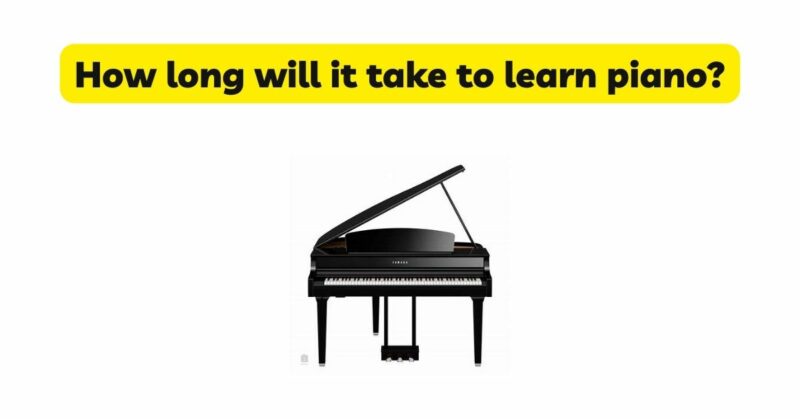Learning to play the piano is an exciting and fulfilling endeavor that ignites the passion for music in many individuals. However, one common question that arises is how long it will take to learn piano. While the journey is unique for each individual, influenced by various factors, this article aims to provide insights into the estimated time it takes to achieve proficiency in piano playing. It is important to note that these estimates are general guidelines, and the actual duration may vary based on personal circumstances and commitment.
- Setting Realistic Expectations: Before delving into the estimated time, it is crucial to set realistic expectations. Becoming proficient in piano playing requires dedication, consistent practice, and a passion for music. Progress may vary depending on individual factors such as prior musical experience, natural aptitude, available practice time, and the desired level of proficiency.
- Beginner Stage (0-6 months): The initial stage of piano learning focuses on developing foundational skills. Beginners learn fundamental concepts such as hand positioning, finger placement, and basic music theory. During this period, learners familiarize themselves with the keyboard, understand note names, and begin playing simple melodies and chords. With consistent practice of around 30 minutes to an hour per day, learners can expect to progress from basic exercises to playing easy songs within six months.
- Intermediate Stage (6 months – 2 years): The intermediate stage is characterized by expanding knowledge and skills. Learners become more comfortable reading sheet music, understanding musical terminology, and playing with proper technique. They explore various musical genres and begin tackling more complex songs. Progress during this stage depends on the time invested in practice, ranging from 1-2 hours daily. With consistent effort, learners can expect to play intermediate-level pieces and develop a greater understanding of musical expression within one to two years.
- Advanced Stage (2-5 years): The advanced stage marks a significant leap in piano playing. Learners delve deeper into music theory, sight-reading, and advanced techniques. They tackle more challenging repertoire, including pieces from renowned composers. Mastery of dynamics, phrasing, and nuanced expression becomes a focus. At this stage, learners may choose to specialize in a particular genre or style. The commitment to daily practice of 2-4 hours is vital. Within two to five years, individuals can expect to achieve a high level of proficiency, capable of performing advanced repertoire and demonstrating a refined musicality.
- Professional Stage (5+ years): The professional stage is characterized by mastery and artistry. This stage is typically pursued by those aiming for a career as a concert pianist, music educator, or professional performer. Attaining this level of expertise requires a deep understanding of music theory, exceptional technical proficiency, and a refined sense of interpretation. At this stage, individuals continue to refine their skills and expand their repertoire. Mastery is an ongoing journey, and the time required to reach a professional level varies significantly, often spanning more than five years of dedicated practice.
- Lifelong Learning: It is important to note that piano learning is a lifelong journey. Even after achieving a high level of proficiency, pianists continue to refine their skills, explore new repertoire, and deepen their musical understanding. The joy of learning and growing as a musician is a continuous process that extends beyond specific time frames.
Factors Affecting Learning Time: Several factors can influence the estimated time to learn piano:
a. Prior Musical Experience: Individuals with prior musical experience may progress more quickly due to a foundational understanding of music theory and instrumental techniques.
b. Practice Time and Consistency: The amount and consistency of practice directly impact progress. Regular, focused practice sessions yield better results compared to sporadic and inconsistent practice.
c. Quality of Instruction: Guidance from a skilled teacher can expedite progress by providing personalized feedback, correcting technique, and offering structured lessons.
d. Natural Aptitude: While anyone can learn to play the piano, individuals with a natural inclination for music may progress more rapidly.
e. Individual Learning Style: Tailoring the learning approach to match personal learning style and preferences enhances the effectiveness and efficiency of the learning process.
Conclusion: The time it takes to learn piano is a subjective journey influenced by various factors. While estimates provide a general guideline, it is important to embrace the individuality of the learning process. Consistent practice, dedication, and a passion for music are crucial elements for progress. Regardless of the time it takes, the joy and fulfillment derived from learning the piano and expressing oneself through music make the journey worthwhile. Remember, it is not solely about the destination but the transformative experience along the way.


